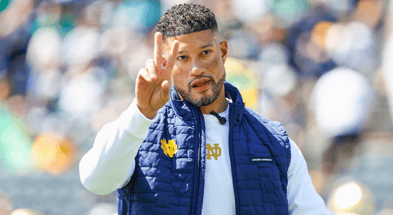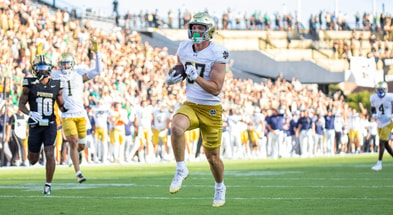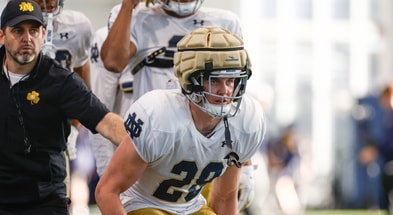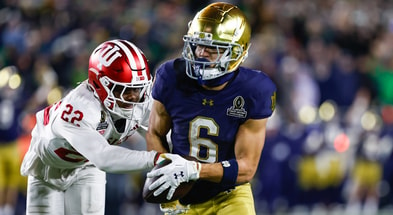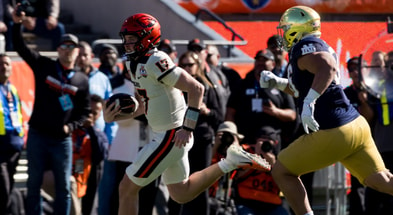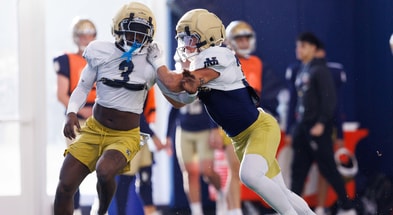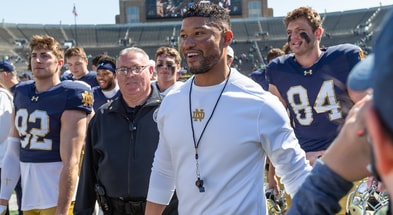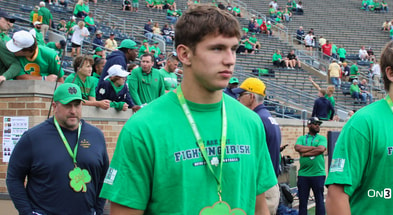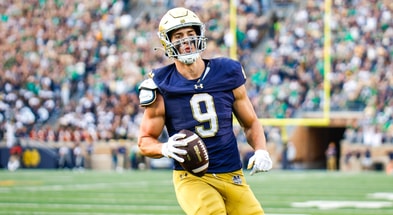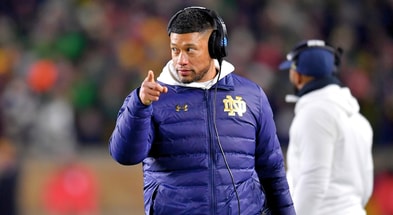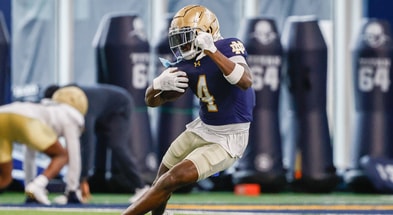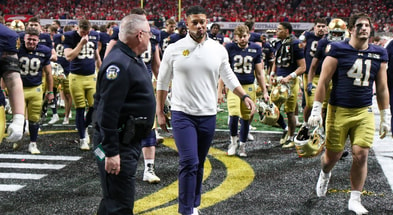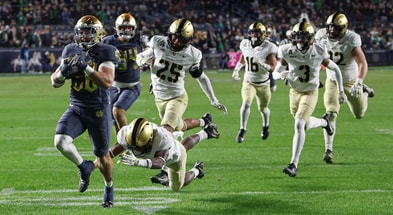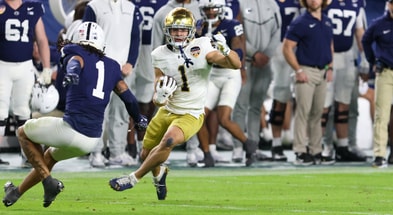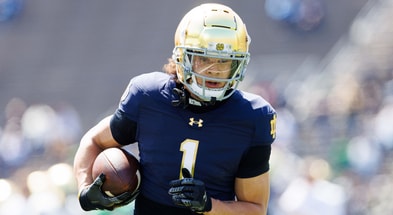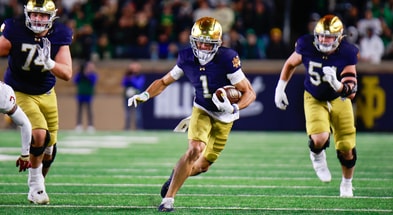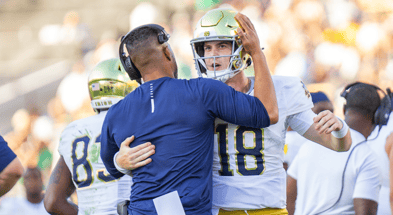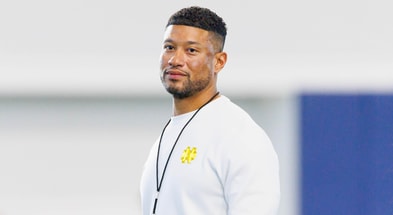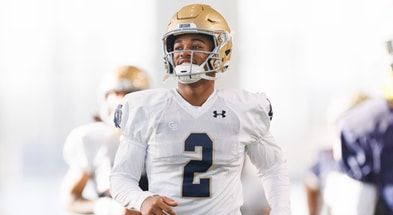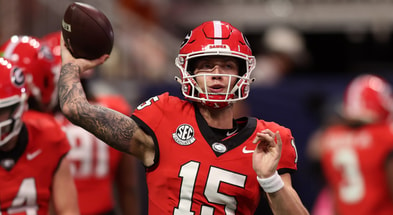Marcus Freeman summer sit-down transcript Part II: USC, Steve Angeli, Notre Dame recruiting and more
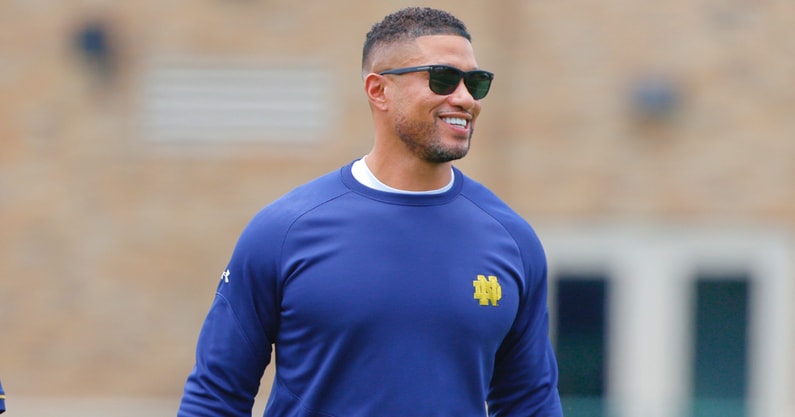
Local reporters in South Bend sat down with Notre Dame head coach Marcus Freeman on Thursday in two separate waves, 30 minutes apiece, for an on-the-record conversation about Fighting Irish football. There was also an off-the-record back-and-forth spanning half an hour for both groups.
This is everything that was asked and answered during the second half of the on-the-record portion of the first sit-down session.
What is your stance on Notre Dame continuing its rivalry with USC?
“It’s a great rivalry for all of college football. If it was up to me, we would play them every single year for the rest of college football. It’s pretty black and white for me. You want my opinion? I want to play them every single year. When? I don’t care. I don’t care when we play them. Start of the season, middle of the season, end of the season — I don’t care. I want to play USC every year because it’s great for college football. It’s great for college football.
“That rivalry, USC-Notre Dame, before I even got to Notre Dame, everybody watched that game. Everyone remembers moments from that game that just stick out in my mind. [Notre Dame director of athletics] Pete [Bevacqua], or Ron [Powlus] or anybody asks me, that’s how I feel. Everybody knows that’s how I feel. But also, I’m not the one dealing with the administrative part of scheduling games. But I think it’s important we continue this rivalry.”
What benefit is there for Notre Dame to play in Los Angeles every other year?
“We’re such a national brand. We recruit coast to coast. We’ve done a really good job in the state of California, the west coast. More than that, all of the west coast. Hawaii. California. Wyoming. Keep going. It’s important that they understand that we play coast to coast. New York to California. We go to Florida this year. We’re in Texas. That’s what Notre Dame does. To eliminate that, it really wouldn’t be beneficial to our program.”
What are the expectations for Notre Dame wide receivers Jaden Greathouse, Will Pauling and Malachi Fields?
“What we learned — what Riley [Leonard] and what we learned — toward the end of that season is that if Jaden Greathouse is covered one-one-one, he’s not covered. Throw him the ball. He’s able to make some catches that some people would assume he’s covered. We have to trust him. He’s not going to out-run everybody. He’s not going to be wide-open. But if he’s one-on-one, give him a chance because more than not he’s going to make the play.
“We’ll continue to see elevation out of Jaden because he’s a grinder. He’s a guy that’s obsessed with improvement. I think he’s going into his third year? Gosh, time flies. He’s just continuously getting better. He’s a playmaker for us, very similar to what we have in Jordan Faison too.
“We had Will here in the spring. He was a little bit phased in because he was coming off of an injury. But the thing I respect about Will is the way he practiced. When he was in there in practice, he practiced at a different pace and a different effort level than what I’d seen in the past. What’s that going to do to elevate the people around him? I love dudes who practice hard and he’s one of those guys. And he’s a playmaker. He can make plays. He’s experienced. But what I like more than everything is his effort. He plays with effort. Tough. I mean, he’s tough, man. You don’t always say that about wideouts. Tough? He is tough.
“It was funny, I was watching the Virginia game probably last week. I sent coach [Mike] Brown a couple text messages. One, I was impressed with the way Malachi threw the ball on a double pass. I said, ‘Faison is going to have some competition for who’s going to be the wideout to throw the ball.’ But two, go back and watch that game; all the screens, he was at the point of attack. That tells me a lot about him.
“If you’re at the point of attack — you’re supposed to be the star wideout, OK, you’re not getting the ball on screens, but they put you to the boundary when they run a screen to the boundary and they put you to the slot when they run a screen to the field — that tells me what type of football player you are. Tough, gritty, high-effort, take pride in blocking. Everybody knows he’s a game-changer as a wideout. You put him to the boundary and say, OK, let’s go. You going to play me man-to-man or are you going to play zone on me? If you play man-to-man, we believe we can win. That’s what I see when I watch Malachi Fields on film. But more than that, now, I have an even greater respect because of how they used him.”
Where is Notre Dame at with the evolution of the defensive end position?
“We have high expectations for Boubacar [Traore] and Jordan [Botelho] to fully get back and, upon full-go, we know what they can do. But there is a lot of trust built with Junior [Tuihalamaka] and Josh Burnham and even Loghan Thomas now is gaining that trust.
“And we’re playing left and right end now. We kind of got away from true Vyper. I don’t even know if we have that on the [depth chart]. Yeah, we have a Vyper. We call him a Vyper. But we’re playing left and right more than anything right now. It makes those guys a little bit interchangeable. You got five, four guys that have played a lot of ball that can at any moment go in the game, to the left, to the right, let’s go. We’re going to be able to play multiple guys with experience.
“I love it. They’re all back. They’re all getting better. You lose RJ Oben, but those four guys are all back. They’re getting better. Loghan Thomas is getting better. That’s going to be a position where they have a lot of depth. We’re going to have to find ways to get them on the field, roll them, and they understand what last year— there’s a lesson in what last year told us; man, the season is long. You’re going to have to roll guys. Stop making permanent decisions based on Week 1. Let the normal football season play out. You’re going to need depth. You’re going to need depth. That’s what they all understand.”
What was it like losing Steve Angeli to Syracuse?
“Listen, what Steve Angeli has done for this program in his three years, three or four years, amazing. I’m a huge fan of Steve Angeli. Huge fan. We had a competition in the spring, and that competition wasn’t answered after 14 practices. I think you have to have honest conversations with those guys in that room, and that’s what I did.
“At the end of the day, Steve made the decision to transfer. Or, it was probably a better opportunity for him to — nothing’s guaranteed — but a better opportunity for him to be the starter in the fall. There’s a more clearer picture. So that’s why he made that decision. And he’s graduated, so there is no hard feelings. It was sadness for me because I love Steve Angeli as a person and a football player, but I support him because it was the right decision for Steve.”
Top 10
- 1New
Manning Passing Academy
College QB attendees announced
- 2Hot
NiJaree Canady
Inks another monster NIL deal
- 3
Evan Stewart injury
Latest on Oregon WR
- 4
MLB Mock Draft
New No. 1, big shakeup
- 5Trending
CFP Title Favorites
Ranking Top 20 to win it all
Get the On3 Top 10 to your inbox every morning
By clicking "Subscribe to Newsletter", I agree to On3's Privacy Notice, Terms, and use of my personal information described therein.
Why is Notre Dame having so much success in recruiting right now?
“I think we’re on the right guys. I’ve been a little hesitant saying, we got to get guys to commit right now. I think previously there’s been a push to how fast can we get as many as we can? Right now, it’s like, let’s get the right guys. Let’s continuously to recruit the right guys, stay on the right guys. That was more important than getting guys to commit just to put pressure on other guys. That’s kind of what we’ve done.
“I think everybody in the program has took on a little bit of ownership of, how do we help sell this place? How do we help recruit and develop relationships? I think it’s just being consistent with the right guys and not be impatient. I’m a not patient person, but also understanding that sometimes the great ones take time. We want it now, but a little delayed gratification is what we’re seeing.”
What is the idea behind ‘left and right’ defensive end and phasing out the Vyper spot?
“It’s more about personnel. Personnel. We don’t need to just put guys into the boundary and say, ‘You’re a guy that can drop. Let’s only play you at Vyper.’ It just limits the opportunities to get on the field. To be able to say, hey, let’s play left and right. You’re into the field, can drop? You’re into the boundary? Can drop. I think it helps you become a little more balanced and unpredictable. Usually, we only drop the guy to the boundary. That’s why we called it the Vyper. We can drop anybody now because they’re playing left and right.”
How have your analytics decisions changed since Anthony Treash got to Notre Dame? Is there an in-game decision you made last year you wouldn’t have made before his arrival?
“I think a lot of my decisions on fourth down comes from the confidence i have in our offense. When you have a quarterback that you believe can get any first down, you’re going to make those decisions. On third, you’re going to sequence calls to be able to go for it on fourth.
“It wasn’t going for it on fourth down as much as it was some of the decisions on, hey, two-minute situations, do I want to use a timeout? Do we want to use— there are a lot of little things you guys probably don’t even care about that goes into game management. Hey, snap the ball with six seconds left on the play clock because we want to make sure that we don’t have to snap it again before two-minute situation.
“There’s not a situation where I said, ‘Hey, Treash, should we go for it on fourth down here?’ He’ll tell me what’s a go. That’s his job. Hey, what’s a go? He’ll tell me that on every down. What’s a go. And I make the decision on do I want to go for it or not and I communicate with [Mike] Denbrock what I think on third down. But it’s the work that’s done outside of Saturdays that have been more beneficial than anything.”
How did Notre Dame get through the 2024 season with fewer practice injuries despite the season being longer than normal?
“I think we practiced close to 15 percent more — I have the numbers in my office — than we ever had and it was the healthiest season we’ve had in my time in terms of injuries from practice. There were some non-preventable injuries in games that happen. If you look at the patterns over the years, the pattern is going to tell us that we’re going to have one of the healthiest years in terms of non-preventable injuries in the game. That’s just what the graphs tell ya. But when you talk about practice injuries, it was the healthiest season we’ve had and we practiced a lot more this past year.
“It’s a constant conversation we have with the sports performance staff. And I got to be willing to bend a bit. It’s not, hey, let’s shorten things. It’s the ebb and flow of practice. How do I wave practice in a way to keep our players safe? I got to be willing to hear, ‘Hey, coach, we got to change a bit. We’re running hot. Let’s pull back a bit.’ I got to make decisions. I don’t like to sometimes, but to me I don’t have to if I have a good plan. If you have a good plan, it lets you go out and practice and be adaptable to what the science is telling ya.”
What have you done this offseason to get better as a coach? Who have you talked to, where have you gone?
“I didn’t do as much traveling this year. There was a lot of things that prevented me from traveling as much. I’ve done a lot more conversations, professional development over the phone with all different types of individuals. I don’t want to name drop, but I talked to Coach [Nick] Siriani [of the Philadelphia Eagles] for a while, I talked to some guys in the NFL just about how do we enhance our game management, how do I practice better, how do I use analytics better, how do we evaluate the roster in terms of financial reasons and all of those different things. What’s my opinion on the changing landscape of college football? To gather an opinion on that, I want to hear others’ opinions on it. I want to hear wisdom. The playoffs. All of those different things.
“That’s kind of been my personal challenge this offseason. And, really, I’ve had a chance to really do a third, fourth and fifth self-scout which has been beneficial to me. I have more time this offseason to truly self-scout with the coaches than I ever have. That was really beneficial to our entire program, to challenge our coaches and ourselves, how do we practice better? OK, we want to start the season— we start the season with some dingers, now. So we can’t ease into the season. Let’s go back and watch Texas A&M. Let’s go back and watch Northern [Illinois]. What were the issues, and how do we attack them in fall camp? That’s probably the areas of growth I’ve definitely tried to find ways to improve on.”
